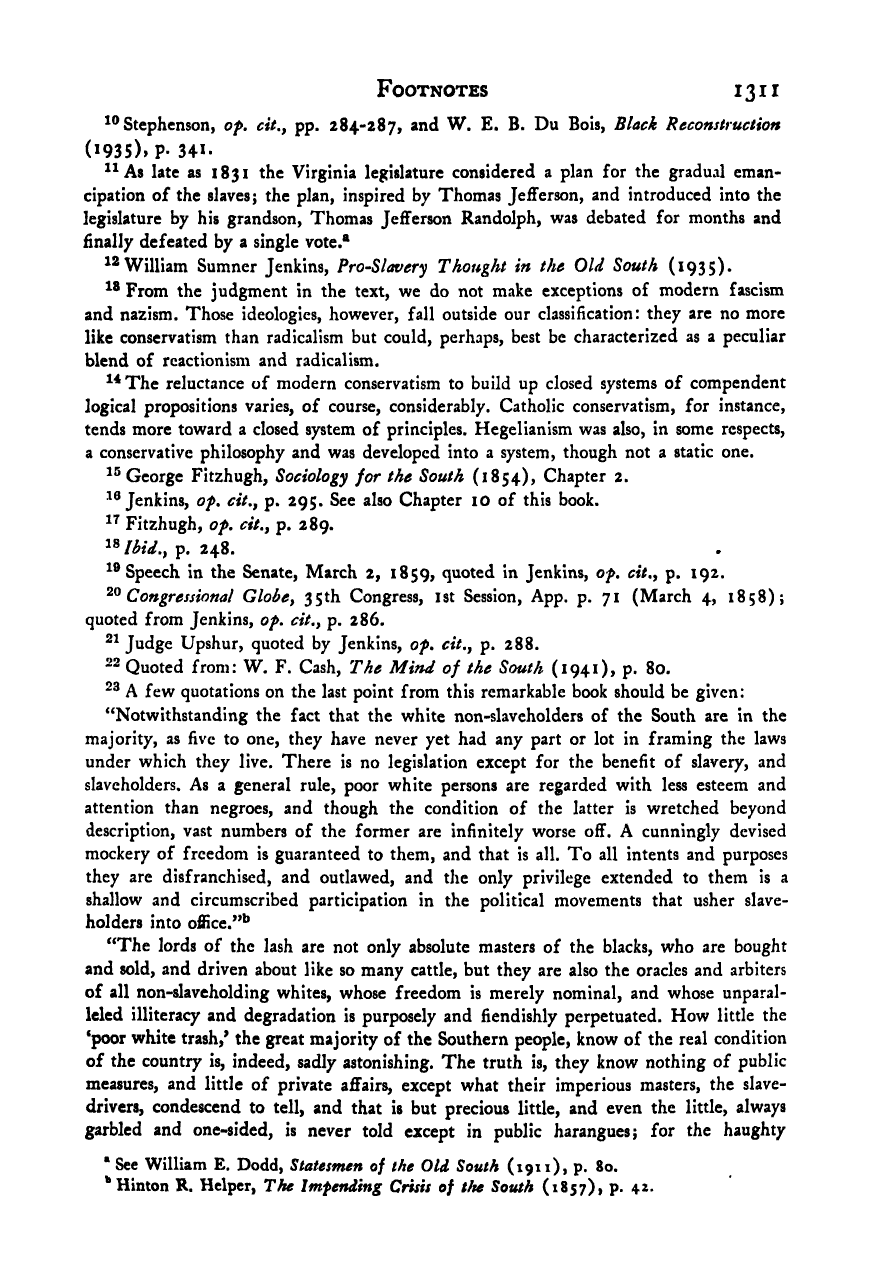Note: Gunnar Myrdal died in 1987, less than 70 years ago. Therefore, this work is protected by copyright, restricting your legal rights to reproduce it. However, you are welcome to view it on screen, as you do now. Read more about copyright.
Full resolution (TIFF) - On this page / på denna sida - Footnotes - Chapter 20

<< prev. page << föreg. sida << >> nästa sida >> next page >>
Below is the raw OCR text
from the above scanned image.
Do you see an error? Proofread the page now!
Här nedan syns maskintolkade texten från faksimilbilden ovan.
Ser du något fel? Korrekturläs sidan nu!
This page has never been proofread. / Denna sida har aldrig korrekturlästs.
Footnotes 13 ii
Stephenson, of, cit,y pp. 284-287, and W. E. B. Du Bois, Black Reconstruction
(i 935 )> P- 341.
As late as 1831 the Virginia legislature considered a plan for the gradual eman-
cipation of the slaves; the plan, inspired by Thomas Jefferson, and introduced into the
legislature by his grandson, Thomas Jefferson Randolph, was debated for months and
finally defeated by a single vote.®
William Sumner Jenkins, Pro-Slavery Thought in the Old South (1935).
From the judgment in the text, we do not make exceptions of modern fascism
and nazism. Those ideologies, however, fall outside our classification: they are no more
like conservatism than radicalism but could, perhaps, best be characterized as a peculiar
blend of reactionism and radicalism.
^^The reluctance of modern conservatism to build up closed systems of compendent
logical propositions varies, of course, considerably. Catholic conservatism, for instance,
tends more toward a closed system of principles. Hegelianism was also, in some respects,
a conservative philosophy and was developed into a system, though not a static one.
George Fitzhugh, Sociology for the South (1854), Chapter 2.
Jenkins, of^ cit,y p. 295. See also Chapter lO of this book.
Fitzhugh, of, cit,y p. 289.
lbid,y p. 248.
Speech in the Senate, March 2, 1859, quoted in Jenkins, of, cit,y p. 192.
^^Congressional Globe, 35th Congress, ist Session, App. p. 71 (March 4, 1858);
quoted from Jenkins, of, cit,, p. 286.
Judge Upshur, quoted by Jenkins, of, cit,, p. 288.
Quoted from: W. F. Cash, The Mind of the South (1941), p. 80.
A few quotations on the last point from this remarkable book should be given:
“Notwithstanding the fact that the white non-slaveholders of the South are in the
majority, as five to one, they have never yet had any part or lot in framing the laws
under which they live. There is no legislation except for the benefit of slavery, and
slaveholders. As a general rule, poor white persons are regarded with less esteem and
attention than negroes, and though the condition of the latter is wretched beyond
description, vast numbers of the former are infinitely worse off. A cunningly devised
mockery of freedom is guaranteed to them, and that is all. To all intents and purposes
they are disfranchised, and outlawed, and the only privilege extended to them is a
shallow and circumscribed participation in the political movements that usher slave-
holders into office.”**
“The lords of the lash are not only absolute masters of the blacks, who are bought
and sold, and driven about like so many cattle, but they are also the oracles and arbiters
of all non-slaveholding whites, whose freedom is merely nominal, and whose unparal-
leled illiteracy and degradation is purposely and fiendishly perpetuated. How little the
‘poor white trash,^ the great majority of the Southern people, know of the real condition
of the country is, indeed, sadly astonishing. The truth is, they know nothing of public
measures, and little of private affairs, except what their imperious masters, the slave-
drivers, condescend to tell, and that is but precious little, and even the little, always
garbled and one-sided, is never told except in public harangues; for the haughty
* See William E. Dodd, Statesmen of the Old South (1911), p. 80.
’‘Hinton R. Helper, The Impending Crisis of the South (1857), p. 42.
<< prev. page << föreg. sida << >> nästa sida >> next page >>